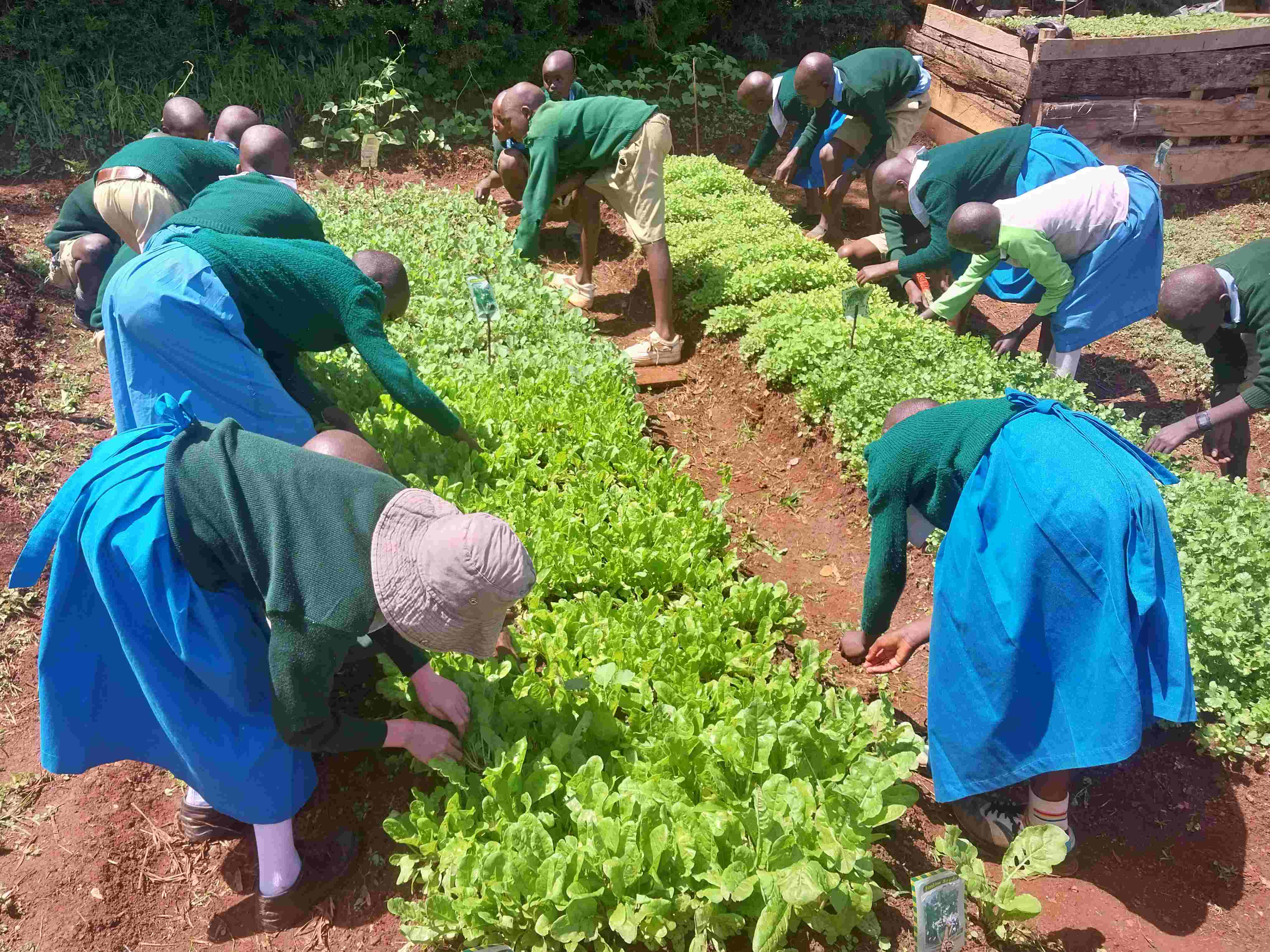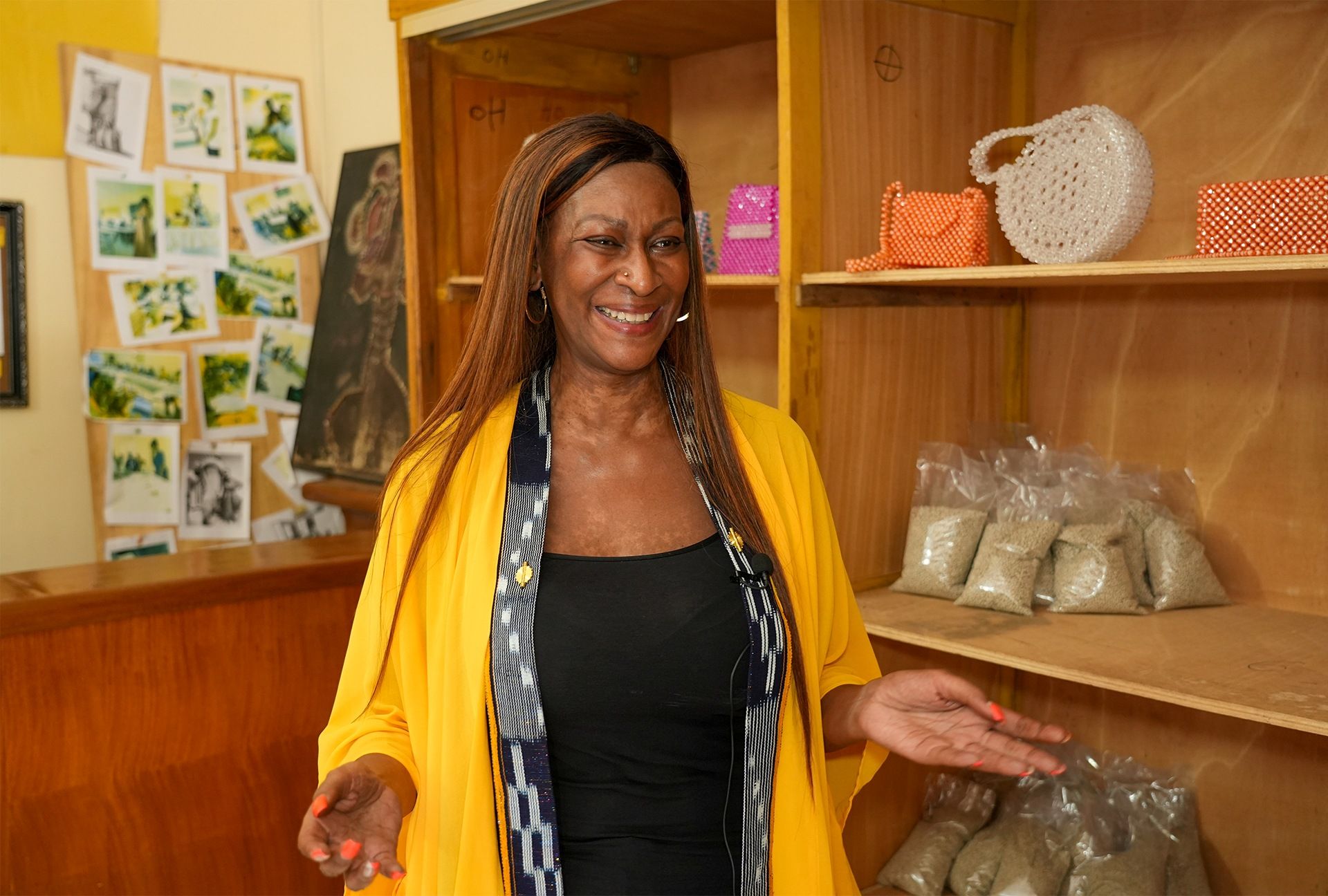When Dominic Orina was transferred to teach in another part of Kenya, he struggled with the local diet. So he planted vegetables. That started a journey that was recently recognised by UNESCO.

Florence Muendo, bird story agency
Most weekdays, Dominic Orina starts the day early, checking on his chickens before taking a look at his garden. Then he heads to school. His day job is teaching at Kugerwet Primary School in the Rift Valley Region in Kenya. But as soon as school is out, Orina is back in his garden, concentrating on teaching a completely different school: his 280K+ Facebook followers, who are all keen on learning how to start and maintain a kitchen garden like Orina's.
Away from his social media, the teacher visits his learners to offer guidance to members of his community who are willing to learn how to garden a variety of vegetables.
Where it all started
It was not always like this. In 2017, Orina was among the first batch of teachers who were moved from their teaching positions to entirely new schools in different parts of Kenya, as part of a "delocalisation" program. Hailing from Nyamira County, in southwestern Kenya, Orina was accustomed to eating a variety of vegetables and potatoes. When he got to Bomet County, in the Rift Valley, Orina struggled to keep up with a diet without the vegetables he was used to eating.
Bomet is largely known for tea farming and dairy production. Farmers who do not engage in dairy farming grow maize – one of the staple foods in the region.
“In Nyamira, almost every household has a kitchen garden where one can get a variety of vegetables such as kale, spinach, pigweed, amaranthus and cabbage. In Bomet, the people plant tea or maize everywhere, leaving little or no space for gardening. The vegetables I enjoyed eating in Nyamira have all of a sudden become scarce,” Orina explained.
In an effort to diversify his diet, Orina decided to purchase eggs. To his shock, the eggs were unaffordable and he soon realised the only way to get a steady and affordable supply of eggs was to rear his own chickens.
“I approached my landlord, Mr Stephen Sitonik, and requested to use the compound to rear some chicken. Being a retired teacher himself, he had a soft spot for me. He not only allowed me to use the space but also gave me some iron sheets to construct a chicken coop. I went back home to Nyamira to source chicks. That is how I started rearing chicken,” Orina shared.
In 2018 and 2019, Orina concentrated on rearing chickens. During this time, he supplied eggs to his neighbours and earned a reputation for their quality.
While Orina had now solved his egg supply problem, he still craved the vegetables he had loved on his menu back home. He started to solve his problem the only way he knew – by building out a vegetable garden, himself.
“I went back to my landlord and requested to start gardening in the unused space in the compound. Since he had seen the work I was doing in rearing chickens, he gave me the go-ahead.”
He had one problem, however. Orina knew that once he planted vegetables, the chickens would eat everything. He had to find an alternative.
So he started growing vegetables in sacks and containers, placing them on the roof where the chickens could not access them.
“I took one sack and I remember vividly it was a 5kg sack that used to contain chicken feed. I put some soil in the sack, planted a kale seedling and placed it on the roof of the chicken coop. I used chicken poop as manure. In less than two months, the kales were not only mature but also bigger than average.”
At the time, gardening was just a hobby as Orina was yet to envision his small project evolving into something bigger than his backyard.
In 2020, at the height of COVID-19, with schools closed, Orina had a lot of free time and decided to get serious about gardening.
“I now started planting a variety of vegetables such as kale, spinach, lettuce, cauliflower, beetroot and onions. When they matured, I shared photos on social media on a group called ‘Let's cook Kenyan meals’. Although I received an overwhelming amount of positive feedback, some people said that I had downloaded the pictures because it was not possible to have such a beautiful garden in Kenya. I went a step further to post a video of myself in the garden, harvesting the vegetables to prove that it was my work. It was at this point that people started flooding my Facebook Messenger to ask for tips,” he said.
Realising he could not reply to all the messages, he started a Facebook page solely dedicated to sharing gardening tips which he named ‘SACKS AND CONTAINER GARDENING TIPS’. The group has amassed over 280,000 followers, who also share their journeys.
“I still receive messages from people from as far as Nigeria who want to start gardening and seek my guidance. I always reply wholeheartedly because I always feel happy when I see people taking the initiative to grow their own food.”
Taking agriculture to school
When schools reopened in January 2021, Orina went back to teach his Grade 3 learners who would soon advance to the next grade. When his learners reached Grade 4, he realised that the syllabus included teaching innovative agriculture, an area he had immense experience in.
“The Competency Based Curriculum (CBC) re-introduced agriculture in primary school and it started in Grade 4. I talked to the headteacher who gave me a small space in the school where we would conduct practical agricultural lessons. I would take the pupils through an oral classroom lesson, then proceed to our garden where we would put the knowledge to practice,” Orina said.
Under his tutelage, the Grade 4 pupils transformed their small piece of land into a garden filled with all types of vegetables such as kale, spinach, capsicum, spring onions, celery, beetroot, broccoli, sweet potatoes and cabbage.
Later, the club started rearing rabbits.
“I taught the children to tap the rabbit’s urine, which we use as foliar fertilizer and pesticides to keep aphids and pests away.”
All along, Orina kept updating his progress with the school kitchen garden on Facebook and YouTube.
After their first harvest, the teacher decided to treat his pupils to an end-of-term party, using the vegetables they had grown, and he bought meat, rice and potatoes to make a meal. When he shared the photos on Facebook, some of his followers noticed that a number of pupils were wearing torn school uniforms and shoes. This led to a charity drive called the “Dress Me Up Initiative” providing Orina’s pupils with new school uniforms, shoes and other school supplies.
“I blur the pictures of my learners whenever I post pictures of them working in the garden on social media. On this particular day, however, one lady noticed that some of my pupils wore torn shoes and sweaters. She approached me and requested to buy the pupils new uniforms. After consulting the parents of the pupils as well as the headteacher, I connected the lady to the families of the needy pupils and they got school supplies. That act of kindness sparked a chain reaction where people from all over now started offering to dress my pupils. Soon enough my learners started receiving uniforms, shoes and other school supplies. Recently, we received sanitary towels for the girls and underwear for both girls and boys. All these are donations from people I have never met,” Orina disclosed.
The bountiful harvest from the school garden also goes back to the pupils who work so hard to keep the garden going.
“I share the harvest amongst the pupils or share with those in need right here in Konoin and sometimes we sell the vegetables to the teachers and neighbours. We use the money to maintain our garden and fund the end-of-term party for the learners.”
Matthew Sigilai is one of Orina’s colleagues.
“I can now get fresh vegetables at an affordable price from my pupils right at the comfort of the school. I am in the process of setting up my own garden so that I can start growing a variety of vegetables too,” Sigilai shared.
Gardening in the community
Initially, Orina restricted his agriculture lessons to the school and his social media pages. However, after getting overwhelming feedback from the parents of his pupils, he decided to pass on his knowledge to his community.
“At first, I was reluctant to teach adults. You see, the people here cultivate tea and I was not sure they would be willing to dedicate a portion of their land to grow vegetables. However, I would receive feedback from parents whenever pupils took home a variety of vegetables which they had planted themselves in school. They were willing to start similar projects at home.”
Orina has been recognised by the Kenyan Ministry of Education for being the most innovative teacher in CBC in his zone. He has also received a UNESCO award for his outstanding community service.
When schools closed for the end-of-year period, in October, Orina knew that this was the perfect opportunity to engage the pupils in home projects before they opened again in January 2024.
“Because all the learners I work with reside from around the community, we formed 10 groups of 5 learners each, considering those who live close to each other within the same neighbourhood. The 5 kids in each group work with their parents to set up kitchen garden projects in their homes. I provided each group with two packets of different varieties of vegetables like amaranthus, cabbage spinach or sukuma wiki (collard greens). Each group chose one home to establish a common vegetable nursery bed and then later when the seedlings were ready for transplanting, they shared them to plant in their individual homes. Once in a while, I visit them to check on their progress and support them in one way or the other.”
Other schools also organise field trips to see what Orina has accomplished.
“I am happy with my learners and the effort they put in(to) agriculture. When schools open, you find the students bringing their harvest to school to show me how well their gardens performed. I always smile when I realise I never gave them the fish but taught them how to fish,” Orina concluded.
bird story agency




